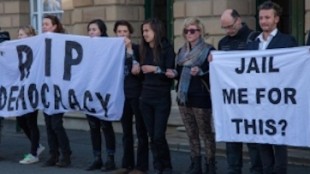North Dakota’s Relaxed Pro Hac Vice Provision for Water Protectors Should Stay
The North Dakota Legislature clarified that it believes constructing pipelines matters more than protecting people’s right to peacefully protest when it passed legislation in January 2017 that increases penalties for and further criminalizes acts of non-violent resistance. The impetus for this batch of anti-protest legislation was the Standing Rock movement, in which the Standing Rock Sioux Tribe brought attention to the Dakota Access Pipeline (“DAPL”) and thousands of people joined the resistance against DAPL’s construction. Since August 2016, over 700 people have been arrested from the DAPL protests, resulting in an unprecedented caseload for North Dakota’s South Central District Court. These cases involve a mix of legal issues, including mass arrests, civil disorder, conspiracy to commit reckless endangerment, indigenous Treaty rights, and environmental rights, among others. The unprecedented buildup and types of cases have made it very difficult, if not impossible, for local counsel alone to provide adequate representation for these water protectors. Special Provision for Adequate Representation In January 2017, attorneys petitioned the North Dakota Supreme Court for changes in North Dakota’s pro hac vice procedures (pro hac vice allows an attorney to legally practice in a jurisdiction where she or he is not licensed without committing unauthorized practice [read more]










